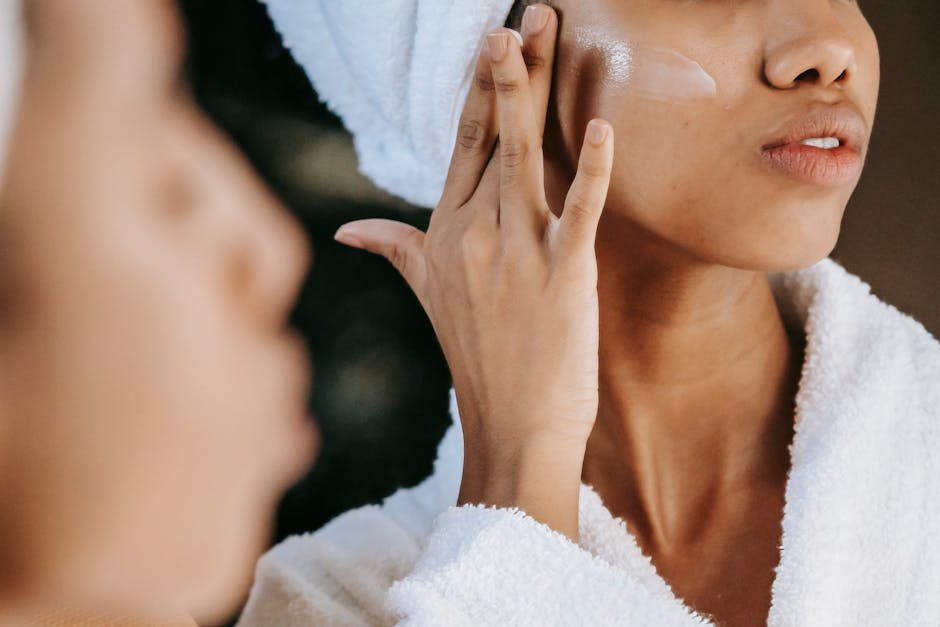The Role of Natural Ingredients in Skincare
Natural ingredients always have played an indispensable role in skincare, often carrying the tag of being ‘skin-friendly’, but why is that so? The answer lies in their composition and the rich array of benefits they offer.
To begin with, many natural ingredients are replete with essential vitamins and antioxidants that are vital for skin health. Take, for example, the Aloe Vera plant, often dubbed as a ‘wonder plant’. Aloe Vera is packed with vitamins A, B, C, D, and E and likewise, rich in anti-inflammatory properties. It is a common ingredient in natural skincare products because it can retain moisture, heal wounds, treat burns, and even combat aging.
Another classic example is green tea, a powerhouse ingredient filled with polyphenols known as catechins, which have potent antioxidant and anti-inflammatory properties, providing protection against damage that can lead to premature aging.
What’s more, natural ingredients tend to be gentler on the skin compared to their synthetic counterparts. Many synthetic skincare products contain harsh chemicals and artificial fragrances which can trigger skin irritation, especially for those with sensitive skin. On the contrary, natural skincare products, rich in ingredients like honey, chamomile and oatmeal, are known for their soothing properties, and they are less likely to cause flare-ups or irritation.
Finally, the addition of natural ingredients in skincare products introduces the opportunity to support sustainable and ethical practices. Ingredients such as coconut oil, shea butter, and tea tree oil can be sourced sustainably, promoting fair trade, and creating a positive impact on communities involved in their production.
In conclusion, natural ingredients aren’t just buzzwords thrown around in the skincare industry. These are nature’s best gifts that have a significant, often underappreciated role in maintaining skin health, promising benefits that are just waiting to be harnessed.

Introduction
In an era when “natural” has become a pervasive buzzword transcending industries, ‘natural skincare’ has made its way to the forefront of the cosmetics world—and rightly so. Individuals across the world are increasingly choosing to dodge the chemical slew commonly found in skincare products, tilting their focus towards nature-based elements. The natural skincare trend, as it’s aptly called, is more than just a fleeting fad. It’s a conscious lifestyle choice responding to today’s context where skin health and environmental sustainability are intertwined like never before.
In essence, natural skincare signifies the usage of extracts derived directly from plants, minerals, or even animal byproducts, as opposed to being laboratory-born. Now, you might wonder—why such a shift in preference? Why is the chatter around ‘natural skincare’ growing louder? Well, the reasons are manifold, and they extend beyond individual benefits to encapsulate global concerns. In the following sections, we delve deeper into these aspects, dissecting the role of natural ingredients, its long-term impacts, and its relevance in today’s environmentally-conscious world.
As our journey into the world of natural skincare unfolds, you’ll learn that this trend is more than a return to centuries-old beauty practices. It’s a proactive step towards skin health and a way to mitigate our environmental footprint. So, buckle up as we bare the essence of natural skincare—the “skin-telligent” choice of the modern, mindful consumer.

The Role of Natural Ingredients in Skincare
Natural ingredients have long played a critical role in skincare, often seen as trusted allies in the quest for a radiant complexion. In this section, let’s explore how precisely these natural components can provide such impressive benefits.
Advantages of Natural Ingredients
Many natural ingredients come with antioxidants, essential oils, vitamins, and other nutrients known for nourishing, repairing, and soothing the skin. Unlike synthetic agents, these substances:
- Work intricately with your skin, acknowledging its complexities and uniqueness.
- Offer an alternative to a one-size-fits-all solution provided by many synthetic products.
- Are typically gentler, reducing the risk of skin irritations or allergic reactions.
Natural Ingredient Highlights
Let’s have a closer look at some specific natural ingredients:
- Aloe Vera: Known for housing an arsenal of antioxidants, enzymes, and vitamins A and C. It’s praised for its anti-inflammatory properties.
- Honey: This natural antimicrobial and healing agent also deeply hydrates the skin.
- Tea Tree Oil: Nature’s go-to answer for acne with robust anti-inflammatory and antimicrobial properties. It’s effective in calming redness, swelling, and inflammation.
These are just a few among many therapeutic ingredients nature provides. You would likely recognize many from the ingredient lists of your skincare creams, serums, and masks.
The ‘Clean Beauty’ Trend
The move towards ‘clean beauty’ has seen an increase in the use of natural ingredients, transitioning from homemade remedies to state-of-the-art skincare labs.
Thus, owing to their proven advantages and everyday usability, it’s safe to assert that natural ingredients are here to establish a lasting legacy in our pursuit of a glowing and healthy complexion. It’s nature communicating with our skin in its native language and creating a conversation our skin loves.

Benefits of Integrating Natural Skincare in Your Daily Routine
Kicking off your day with an organic face cream or ending it with a chemical-free cleanser—skincare isn’t just a fad; it’s a journey. And going “natural” in this journey might just be the best move you’ll ever make for your skin. This section is for those who’ve ever wondered, “Why natural skincare?” Well, keep reading folks.
First off, natural skincare products have a knack for being extra gentle on your skin. These products are often free from harsh chemicals, synthetic fillers, and artificial colors known for causing irritations or allergies, allowing your skin to bask in the pure goodness of Mother Nature. So, imagine feeding your skin with wholesome stuff like chamomile, lavender, aloe vera, or tea tree oil instead of unpronounceable chemical compounds. Your skin would be thanking you in no time.
On top of that, natural skincare products are brimming with a beneficial cocktail of antioxidants, vitamins, and essential oils that deeply nourish and replenish the skin from within. Nutrient-dense ingredients such as green tea extract, vitamin E, or avocado oil can fight off harmful free radicals, slow down aging, and retain your skin’s natural moisture levels. In simpler terms, integrating natural skincare into your daily routine is like trading fizzy drinks for fresh juice; it’s more wholesome, healthier, and satisfying in the long run!
However, the beauty of natural skincare doesn’t just stop at combating dryness or breakouts. One of the biggest dividends of adopting a natural skincare routine is the long-term impact. Indeed, it’s a virtuous circle. Your skin absorbs these natural, life-enriching nutrients day in and day out, leading to healthier skin cells, a better complexion, and that radiant glow that is not just temporary but lasts for a long time.
So, here’s the long and short of it—integrating natural skincare into your daily routine isn’t just about the short-term highs or instant results. It’s an investment in your future skin, a pledge to care for it not just today, but every day. Sure, the transition takes time and patience, but like all good things, the benefits of natural skincare truly are worth waiting for.

Environmental Impact of Natural Skincare Products
As we treat and nourish our skin, it’s important to remember that our choices also impact the world around us. One of the lesser-known perks of using natural skincare products lies in their environmental footprint, or more accurately, the lack of it.
The process of creating conventional skincare products often involves chemicals that can be harmful not just to our skin, but also to the environment. Imagine every drop that swirls down our drains, eventually reaching oceans, potentially harming marine life. Conversely, natural skincare products, formulated with plant-based, biodegradable ingredients, create a much softer impact on the environment when broken down.
Consider the packaging. Often, natural skincare brands are more likely to use recyclable, biodegradable packaging or implement refill programs. This reduces waste and makes it easier for consumers to make eco-friendly choices. In comparison, conventional skincare products are typically packaged in single-use plastic containers that contribute to our global plastic pollution crisis.
Not to mention, sourcing natural ingredients often supports sustainable farming practices, unlike conventional skincare manufacturing, which may rely on ingredients derived from environmentally damaging practices.
However, it’s not enough to simply label a product as “natural”. It’s crucial that brands prioritize sustainable, ethical sourcing and that consumers make an effort to scrutinize a brand’s values and practices. Because remember, natural skincare isn’t just about being kind to our skin—it’s also about being kind to Mother Nature.
The choice to embrace natural skincare isn’t just a personal commitment to our wellness but a conscious move towards sustainability. That’s why it’s essential for not just individuals but the skincare industry as a whole, to continually strive for eco-friendly, sustainable practices. So, the next time you’re about to buy a skincare product, take a moment to think about its journey from the shelf to your skin and beyond.

Addressing Common Myths About Natural Skincare
There are several old wives’ tales and misconceptions surrounding the realm of natural skincare, with many overlooking its prowess and effectiveness due to some common myths. So, let’s roll up our sleeves and debunk some of these misconceptions, taking a detour from fiction to scientific fact.
The first and most prevalent myth about natural skincare is that it’s less effective than its synthetic counterparts. This belief stems from the mistaken perception that natural equals weak. However, numerous studies prove otherwise. For instance, ingredients such as tea tree oil demonstrate powerful antibacterial and antifungal properties. Similarly, antioxidants found in vitamins C and E, commonly found in citrus fruits and wheat, are known to protect the skin against cell damage from pollution and sun exposure.
Moreover, think aloe vera, known for its soothing, healing, and anti-inflammatory properties, widely acknowledged for promptly supporting sunburn and skin lesions. Far from weak, these natural ingredients pack quite a punch while staying gentle on the skin.
The second myth that needs debunking is the idea that “natural = hypoallergenic,” meaning it can’t cause any allergic reactions. Just because an ingredient is natural doesn’t necessarily mean that it’s safe for all skin types. After all, even people are allergic to natural elements like plants and flowers. Therefore, understanding your skin type and being aware of any potential allergens is crucial when choosing skincare products.
Finally, the notion that “if it’s good enough to eat, it’s good enough for your skin” is worth addressing. Undoubtedly, many natural ingredients beneficial for our skin get derived from our diet. However, skin absorption and digestion are vastly different processes. Not all nutritious foods will exert the same benefit to your skin as they do your digestive system once applied topically.
In the end, we encourage consumers to practice informed decision-making. Understanding the benefits and limitations of both natural and synthetic ingredients is key to choosing products that suit your skin best. Consider the scientific evidence, the source of ingredients, and their concentration. Do your research, break away from the myths, and give natural skincare products the credit they deserve.

Comparative Analysis: Natural Vs Synthetic Skincare Products
As you tiptoe into the skincare world, you’ll often find a dichotomy between natural and synthetic products. Making an informed choice requires accurate knowledge of both realms.
Natural Skincare Products
Natural skincare products take advantage of Mother Nature’s bounty, filling themselves with botanical extracts, oils, and antioxidants. This switch is much like converting your diet to organic, which certainly has benefits. Plant-derived ingredients often have curative and therapeutic qualities, encapsulating ancient wisdom of healing and beautifying with nature.
- Benefits: Allows you to utilize natural healing and beautifying methods, akin to aloe’s soothing nature to lavender’s calming charm.
Nevertheless, “natural” does not always equate to safety. Some natural ingredients can produce allergic reactions, emphasizing the importance of thorough label reading and patch tests.
Synthetic Skincare Products
Synthetic skincare ingredients often receive negative press, but they’re not all harmful. They usually act as preservatives to extend product life or stabilizers, improving texture and feel. The key lies in distinguishing beneficial synthetic ingredients from harmful ones.
- Underlined Purpose: Synthetics increase product shelf life and enhance texture and feel.
Unfortunately, a potential drawback is that synthetic ingredients can often contain chemicals that accumulate in the body over time – a process called “bioaccumulation.” Substances like parabens and phthalates have raised concerns due to their potential health risks. However, not all synthetics are unsafe for the skin, and certain ones may be skin-friendly.
Final Thoughts
The natural vs synthetic debate isn’t a clear-cut dichotomy. Instead, it leans towards natural products due to their inherent therapeutic properties and fewer tendencies for bioaccumulation. However, remember that skincare is deeply personal. What works for one may not work for everyone. The best skincare routine combines knowledge, understanding of your skin’s needs, and safe, effective ingredients — whether natural or lab-grown.

Transitioning to a Natural Skincare Routine: A Practical Guide
If you’re enthused by the idea of incorporating natural skincare into your daily regimen but are unsure where to start, you’re not alone. Transitioning from conventional, synthetic products to ‘au naturel’ is not an overnight task; it’s a gradual process that calls for research, trial, and some inevitable error. Here’s a practical guide to help ease your transition.
Firstly, not all natural products will suit every skin type. It’s crucial to know your skin’s needs and tolerance. Research about different natural ingredients and their specific benefits is key. For instance, some ingredients are hydrating, like aloe vera, while others like tea tree oil can help combat acne. Begin with identifying natural alternatives to your existing skincare products.
Next, incorporate one product at a time into your routine. This slow but steady approach can help to track changes and pinpoint any potential irritants. It’s not unusual for your skin to undergo a “detox” period when transitioning to natural products. Temporary breakouts or an imbalanced feeling on the skin might occur, so don’t be quick to label new products as ineffective or irritating.
A versatile star in the natural skincare galaxy is coconut oil. This all-around champion works as a moisturizer, hair conditioner, makeup remover, and even a lip balm. Honey is another MVP – it can serve as an acne treatment, natural exfoliator, and soothing skin conditioner. Remember, versatility can be cost-effective when switching routines.
And lastly, be patient. Patience is as much a part of this skin-empowering journey as are the products you’re exploring. Immediate results are rare. Rather, it’s the regular, consistent use of these natural ingredients that yields real, lasting results.
Transitioning to natural skincare may seem daunting initially, but the journey is as rewarding as its destination. To provide a touch of inspiration as you embark on this new path, consider the countless success stories worldwide. These green advocates have not only seen improvements in their skin condition but also discovered a profound sense of harmony in aligning with nature’s rhythm. Their experiences attest to the remarkable potential encapsulated in ‘au naturel’.

Conclusion
As we draw the curtains on this enlightening journey, it becomes increasingly clear: Natural skincare isn’t just another fleeting beauty world trend. Its significance is two-fold, offering comprehensive benefits for not just our skin but also Mother Earth.
On one hand, it gives skin the gentle yet powerful nourishment it requires, removing the risk of synthetic irritants or allergens. Whether we’re talking about the moisturizing prowess of shea butter or the anti-inflammatory properties of turmeric, these natural ingredients provide a multitude of skincare benefits, outlined earlier. The effect on our skin health is substantial and long-lasting, making a compelling case to revamp our daily routines.
On the other hand, tapping into natural skincare’s potential means we make a firm nod towards sustainable practices — a change our planet direly needs. Skin is our first line of defense and it demands respect! But giving it the care it needs shouldn’t undermine the environmental harmony. That’s the beauty (no pun intended) with natural skincare; it offers this peaceful co-existence.
Thus, it’s more than apparent that integrating natural skincare into our routine isn’t something to dismiss as a fad. It empowers us to take control of our skin health while also making an eco-conscious decision. It’s a win-win, really!
In conclusion, remember, the leap to natural skincare isn’t an overnight transition, and it doesn’t have to be! Take your time, do your research, and incorporate what resonates with you and your skin. After all, part of what makes natural skincare so wonderful is the ability to make informed choices. Here’s to a healthier skin and a greener planet! Let’s celebrate the power of nature together. With open arms and glowing skin, let’s embrace the natural skincare revolution.
